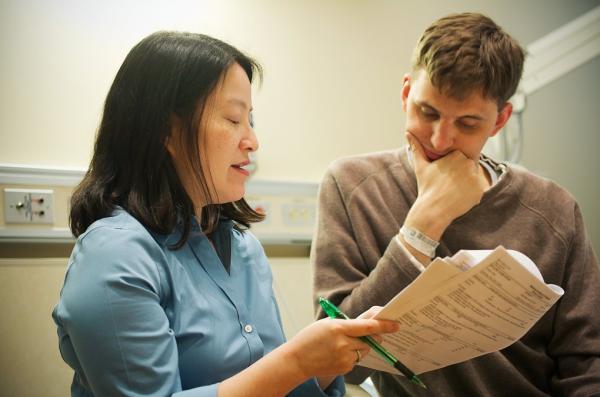A New Life for Lifesaving Data
With the NIH Research Festival underway, it’s a good time to consider how primary research pays even more dividends through data sharing for secondary and future research use. Data sharing (e.g., via publication, collaboration, and repositories) ensures that data are used and published more broadly than they otherwise would be, promoting more rapid translation into biomedical and scientific advances, thus allowing American taxpayers who fund our research the opportunity to benefit more fully from our work.

Clinical trials produce vast amounts of human data that can be valuable to other researchers, but only if it is shared broadly.
In the clinical arena, data sharing is particularly important. When humans participate in medical research, they are giving of their bodies, time, and energy to benefit research and society at large. To maximize the benefits of their generosity, we need to share data as widely as possible.
Broad data sharing and re-use has already enabled significant advances in genomic and phenotypic data for many conditions, including Parkinson’s, alcohol dependence, and psychiatric disorders. It has also facilitated great strides in methods development, among other benefits.
NIH has a long-standing commitment to data sharing. Many NIH Institutes and Centers (ICs) have specific programs in place to advance data sharing, and there are a number of initiatives on the horizon to further promote data sharing. See a list of some of these NIH data sharing policies.
To emphasize the importance of sharing human data, the Intramural Research Program (IRP) issued a new Human Data Sharing Policy (HDS Policy) at the end of July. The HDS Policy applies to all research projects with human data initiated on or after October 1, 2015. Under the policy:
- Data should be collected in a way that permits and promotes the broadest sharing possible. This means that studies and consents should be designed for broad sharing.
- Investigators should share data broadly for secondary research purposes, consistent with applicable laws, regulations, policies, and agreements.
- Investigators should deposit data in publicly accessible research repositories for sharing whenever feasible.
To ensure we are meeting these goals, investigators need to plan for data sharing prior to starting their research. Consequently, the HDS Policy requires investigators to develop data sharing plans (DSPs) before projects undergo scientific review and prior to conducting the research. Any project that collects, uses, or stores human data or derivatives of human data needs a DSP.
Researchers at NIH need to pay special attention to consent. In some cases individual human research participants may object to secondary data sharing. Recent history highlights this fact in certain populations, such as the Havasupai Indian Nation. But, NIH, as a public institution engaged in scientific discovery, favors broad sharing of de-identified data to benefit future research activities whenever possible.
When designing DSPs, think not only about consent but also about where and how data will be distributed. There is no single standard database through which IRP data must be shared. A wide array of repositories and resources are available, including NCBI’s database of Genotypes and Phenotypes (dbGaP). View a list of NIH-supported repositories that make data accessible for secondary use.
Remember too that, while research projects that are ongoing or began scientific review before October 1, 2015, are not covered, investigators are expected to share their results, whenever possible, through traditional channels for sharing, e.g., publication, collaboration, and repositories. Your IC Scientific Director or delegate is available to help, and your feedback is welcome.
Every year the NIH Research Festival demonstrates and highlights the extraordinary research undertaken here. Let’s make sure we harness the full potential it offers by sharing our data as broadly as we can with our fellow researchers, so that the generous contributions of human research participants may potentially improve the lives of countless others.
Related Blog Posts
This page was last updated on Wednesday, July 5, 2023
